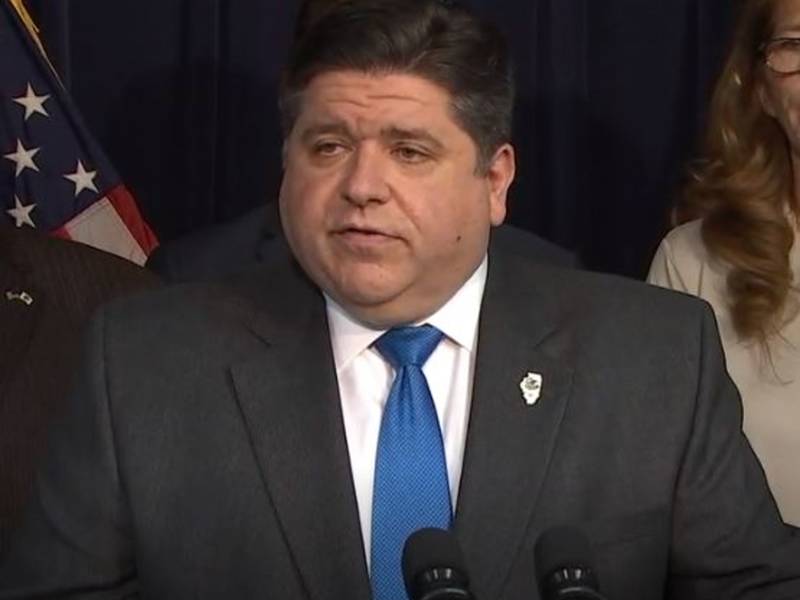CHICAGO — Gov. JB Pritzker appeared Tuesday at a press conference in Chicago with supporters of his proposed graduated income tax plan, as his office released a tax calculator aimed at showing how his recommended rate changes would impact your household’s annual tax bill.
Pritzker campaigned on a promise to push for a constitutional amendment to enact a progressive income tax in Illinois. He unveiled new proposed tax rates last Thursday, along with tax credits for working-class parents and property taxpayers.
“My administration is committed to being fully transparent and giving everyone the tools that they need to fully understand this proposal. To that end, I am proud today to introduce the ‘Fair Tax Calculator,'” Pritzker said. “You plug in your income, your number of children, if you’re a parent, and your property tax bill if you own a home.”
Currently, Illinois income tax is 4.95 percent across the board. The state’s flat income tax is mandated by the 1970 Illinois Constitution. The governor’s plan, which Pritzker calls the “Fair Tax,” would cut rates for those reporting under $100,000 in income and keep them in place for those making up to $250,000. That accounts for 97 percent of filers, according to the governor’s office. The plan projects that raising marginal rates on those making up to $1 million and enacting a 7.95 percent effective rate on all income for those reporting more than $1 million income will generate $3.4 billion.

The governor’s office created an income tax calculator to show how your state tax rate would change under a potential progressive income tax.
The non-partisan Institute on Taxation and Economic Policy last year found low-income families in Illinois have the third-highest effective tax rate of anywhere in the nation. Households reporting incomes up to $21,800, the bottom fifth, pay 14.4 percent of their total income in state and local taxes.
Those making between $21,800 and $231,500 in Illinois pay between 11 percent and 12.6 percent of their income. However, those making $231,500 to $537,400 pay just 9.4 percent of their income to state and local governments. The top 1 percent — households reporting more than $537,000 in annual in-state income — pay an average of 7.4 percent of the income, slightly more than half what the lowest 20 percent of earners fork over.
Pritzker ran for governor with the promise to overhaul the state’s flat tax, which he said put too much of the burden on low-income taxpayers. As an heir to the Hyatt hotel fortune and one of 11 billionaires in the seventh-richest family in the country, the governor suggested he should have to pay more in taxes while working people should pay less.
“Everywhere that I went, the people of Illinois, the working families of Illinois, want to be treated fairly,” Pritzker said. “I heard that loud and clear, over and over again. As I said throughout my campaign, Illinois’ flat tax system is regressive and unfair to the middle class and those who are striving to get there.”
Illinois is one of only eight states in the country with a flat tax, which results from the 1932 Illinois Supreme Court decision Bachrach v. Nelson.
According to a report the Center for Budget and Policy Priorities, a Washington, D.C.-based progressive think tank, the “millionaire’s tax” of 7.95 percent at the top bracket, along with a matching hike in corporate taxes from 7 percent to 7.95 percent, may give Illinois the opportunity to make “more ambitious investments in its future.”
But some tax experts, like Ralph Martire, executive director of the bipartisan Center for Tax and Budget Accountability, said Pritzker’s proposal “wouldn’t be enough” to cover Pritzker’s promised spending, according to the Chicago Tribune. An analysis from the conservative Illinois Policy Institute found the governor’s revenue projections “overstate by nearly $2 billion” the amount of money a progressive income tax would actually generate.
Earlier: New Proposed State Income Tax Rates Unveiled By Gov. JB Pritzker »

Pritzker said there were only two other options to handle the state’s multi-billion-dollar structural deficit, which has been exacerbated by unpaid bills that piled up during a budget standoff that lasted more than two years. Either the state implement across the board cuts of 15 percent, which he said would trigger significant increases in local property taxes to cover lost school subsidies and other funding from Springfield, or raise the flat tax by 20 percent on all taxpayers. The governor said opponents of his proposal should present a realistic alternative.
“We should all demand that they acknowledge the facts and tell us specifically what they support that will address a $3.2 billion deficit, will pay down $15 billion of debt associated with unpaid bills and protect working families,” Pritzker said at the press conference Tuesday, a day after meeting with major credit ratings agencies and investors that he described as positive. Ratings agencies have expressed concerns about whether the governor’s budget proposal is sufficient to put the state’s finances on firm footing.
“The investors seem pleased to see that we are getting our fiscal house in order and that we’re heading in the right direction,” Pritzker told reporters, noting it was important to address both the ongoing structural imbalance in the state’s budget and to continue “whittling down” the state’s more than $130 billion in net pension liability.
Pritzker has not supported any amendment to the state constitution to curtail the growth in unpaid pension obligations for state workers, and on Tuesday he said he opposed extending sales taxes to services.
“Flat taxes are regressive. I choose not to look for revenue, if I can avoid it, in flat taxes. Sometimes you can’t avoid it,” Pritzker said. “If you want to make the system fairer, which is what I’m trying to do, the best way to do it is what I’ve put forward.” He said there are good ideas on both sides of the aisle but doing nothing is not an option.
The Illinois Republican Party has opposed the changes, noting that the Pritzker’s proposed income tax rate for corporations and trusts would one of the highest in the nation — 10.45 percent for corporations and 9.45 percent for trusts, when the state’s personal property replacement tax is included.
Tim Schneider, the state party chair, called Pritzker’s tax plan hypocritical due to the governor’s “many overseas holdings that allow him to dodge untold millions in state and federal taxes” and demanded he move his overseas wealth to Illinois in order to pay his “fair share” under his proposed rates. Republicans pointed to Chicago Tribune investigations that found a dozen offshore investment funds linked to Pritzker, as well as “35 offshore and domestic trusts and shell companies.”
“As one of Illinois’ richest residents and leading tax hike proponents, it’s time for Gov. Pritzker to pay his fair share, before expecting Illinois taxpayers to pay more,” Schneider said in a statement Tuesday. “Tax fairness should start with our governor.”
The Senate Republican Caucus came out against Pritzker’s plan last week.
“Without guaranteed protections for middle class families, we are opposed to the governor’s $3.4 billion tax increase,” it said in a statement.
State lawmakers “cannot tax, borrow and spend our way out of this deficit as the governor has proposed,” House Republican leader Rep. Jim Durkin said last month in response to Pritzker’s budget plan. “Illinois families deserve a focus on reform, including our out-of-control pension costs and sky high property taxes, and not a penny more in new taxes or fees.”

Pritzker was joined at the Thompson Center in Chicago Tuesday by two union representatives and the leader of a progressive political action coalition.
Carole Pollitz, a business agent with IBEW Local 134, praised Pritzker for following through on his campaign promise to push for a progressive tax.
“We feel that we have a level playing field now, and it’s all going to make a lot of people very happy,” Pollitz said.
President of the Chicago Federation of Labor Bob Reiter said people who complain about the richest 3 percent paying more while 97 percent of Illinoisans get a tax break do not have the state of Illinois as a priority.
“It also takes a lot of courage to go home and tell your wife that you just proposed increasing your own taxes,” Reiter said. “Even though I know [First Lady] M.K. [Pritzker] is of a like mind.”
Bill McNary, co-director of Citizen Action Illinois and a founding member of the Responsible Budget Coalition, said it was necessary to renew the “basic contract” between state government, labor and the broader community.
“We finally have a proposal that is fair. It allows people with higher incomes to pay higher taxes and people with lower incomes to pay lower taxes,” McNary said. “This is about creating jobs and protecting the middle class. This is for the people who are trying to keep a roof over their head, and food on their table, gas in their car and maybe send their kids to college.”
McNary pointed to studies showing people making under $22,000 pay nearly twice as large a share of their income in state and local taxes as those who make more than $540,000. Paraphrasing a quotation from soul music legend Bill Withers, one must past through “alright” on the way to “wonderful,” he said.
“If conservatives hate government in theory, and progressives hate government in practice, we are never going to get the revenue we need.”
How will JB Pritzker’s proposed tax plan affect your tax bill? Try the governor’s “Fair Tax Calculator” to see how your rate might change.
https://patch.com/illinois/across-il/how-much-would-you-pay-illinois-income-tax-under-pritkzer-plan







